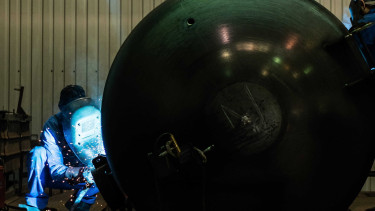EMA starts rolling review of Russia's COVID-19 vaccine Sputnik V

The CHMP's decision to start the rolling review is based on results from laboratory studies and clinical studies in adults.
These studies indicate that Sputnik V triggers the production of antibodies and immune cells that target the SARS-CoV-2 coronavirus and may help protect against COVID-19
, the EMA said in a press release on Thursday.
EMA will evaluate data as they become available to decide if the benefits outweigh the risks. The rolling review will continue until enough evidence is available for formal marketing authorisation application.
EMA will assess Sputnik V’s compliance with the usual EU standards for effectiveness, safety and quality.
While EMA cannot predict the overall timelines, it should take less time than normal to evaluate an eventual application because of the work done during the rolling review.
EMA will communicate further when the marketing authorisation application for the vaccine has been submitted.
The Russian Direct Investment Fund (RDIF, Russia's sovereign wealth fund) said in a seperate statement that a number of EU member states have made individual decisions to register Sputnik V without EMA approval. The vaccine is currently approved for use in Hungary and Slovakia.
"The Gamaleya National Center and RDIF cooperate with national regulatory authorities around the world and provide comprehensive data on Sputnik V clinical trials. It is one of the world's top three coronavirus vaccines in terms of the number of approvals issued by government regulators," the RDIF said.
To date 42 countries with total population of more than 1.1 billion people have authorized the use of Sputnik V.
On February 2, 2021 The Lancet, one of the world's oldest and most respected medical journals, published interim results of a Phase III clinical trial of Sputnik V, confirming the vaccine’s high efficacy of 91.6% and safety. Sputnik V provides full protection against severe cases of COVID-19.
"The trial results show a consistent strong protective effect across all participant age groups. Also known as Gam-COVID-Vac, the vaccine uses a heterologous recombinant adenovirus approach using adenovirus 26 (Ad26) and adenovirus 5 (Ad5) as vectors for the expression of the severe acute respiratory syndrome coronavirus 2 (SARS-CoV-2) spike protein. The use of two varying serotypes, which are given 21 days apart, is intended to overcome any pre-existing adenovirus immunity in the population," according to the interim results of a Phase III clinical trial.
Following EMA approval, we would be able to provide vaccine for 50 million Europeans starting from June 2021
, said Kirill Dmitriev, CEO of the RDIF.
How is the vaccine expected to work?
Sputnik V is expected to work by preparing the body to defend itself against infection with the SARS-CoV-2 virus. This virus uses proteins on its outer surface, called spike proteins, to enter the body’s cells and cause COVID-19.
Sputnik V is made up of two different viruses belonging to the adenovirus family, Ad26 and Ad5. These adenoviruses have been modified to contain the gene for making the SARS-CoV-2 spike protein; they cannot reproduce in the body and do not cause disease. The two adenoviruses are given separately: Ad26 is used in the first dose and Ad5 is used in the second to boost the vaccine’s effect.
Once it has been given, the vaccine delivers the SARS-CoV-2 gene into cells in the body. The cells will use the gene to produce the spike protein. The person’s immune system will treat this spike protein as foreign and produce natural defences − antibodies and T cells − against this protein.
If, later on, the vaccinated person comes into contact with SARS-CoV-2, the immune system will recognise the spike protein on the virus and be prepared to attack it: antibodies and T cells can work together to kill the virus, prevent its entry into the body’s cells and destroy infected cells, thus helping to protect against COVID-19.
What is a rolling review?
A rolling review is a regulatory tool that EMA uses to speed up the assessment of a promising medicine during a public health emergency. Normally, all data on a medicine or vaccine’s effectiveness, safety and quality and all required documents must be ready at the start of the evaluation in a formal application for marketing authorisation. In the case of a rolling review, EMA’s human medicines committee (CHMP) reviews data as they become available from ongoing studies. Once the CHMP decides that sufficient data are available, the company can submit a formal application. By reviewing the data as they become available, the CHMP can come to an opinion on the medicine’s authorisation sooner.
During the rolling review, and throughout the pandemic, EMA and its scientific committees are supported by the COVID-19 EMA pandemic task force (COVID-ETF). This group brings together experts from across the European medicines regulatory network to advise on the development, authorisation and safety monitoring of medicines and vaccines for COVID-19 and facilitate quick and coordinated regulatory action.
The RDIF listed a number of key characteristics and advantages of Sputnik V:
- Efficacy of Sputnik V is 91.6% as confirmed by the data published in the Lancet, one of the world's oldest and most respected medical journals; it is one of only three vaccines in the world with efficacy of over 90%; Sputnik V provides full protection against severe cases of COVID-19.
- The Sputnik V vaccine is based on a proven and well-studied platform of human adenoviral vectors, which cause the common cold and have been around for thousands of years.
- Sputnik V uses two different vectors for the two shots in a course of vaccination, providing immunity with a longer duration than vaccines using the same delivery mechanism for both shots.
- The safety, efficacy and lack of negative long-term effects of adenoviral vaccines have been proven by more than 250 clinical studies over two decades.
- The developers of the Sputnik V vaccine are working collaboratively with AstraZeneca on a joint clinical trial to improve the efficacy of AstraZeneca vaccine.
- There are no strong allergies caused by Sputnik V.
- The storage temperature of Sputnik V at +2+8 C means it can be stored in a conventional refrigerator without any need to invest in additional cold-chain infrastructure.
- The price of Sputnik V is less than $10 per shot, making it affordable around the world.
Cover photo: Getty Images








